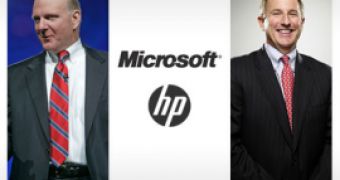The new infrastructure-to-application model is the core element behind a three year, $250 million alliance between Microsoft and HP, with the end goal to simplify technology environments. At the heart of the duo’s agreement is not only the next-generation infrastructure-to-application model, but also a commitment to catalyze the evolution of application implementation in private and public cloud computing environments, as well as streamline and automate management tasks to reduce Total Cost of Ownership (TCO).
What the two companies are actually prepared to offer is a comprehensive technology stack, which spans from infrastructure to applications and to the Cloud. Behind the concept of infrastructure-to-application model is the vision to offer corporate customers, but also smaller businesses a lineup of end-to-end solutions for their environments. According to the Oliver Rist, sr. product manager Windows Server Marketing, the new offerings will feature a key advantage over competitive products, namely the intimate integration of hardware, applications and services.
“This is clearly a big commitment on our part. Overall, our intent is to deliver no less than a next-generation computing platform. The goal is to lead the adoption of cloud computing while helping companies realize immediate business benefits through IT. With this partnership the two companies are working toward new models for application delivery, hardware architecture and IT operations,” explained Brad Anderson, corporate vice president, Management And Services Division. “Together HP and Microsoft will deliver a deeply integrated IT stack for business applications.”
HP will obviously be responsible with providing the hardware infrastructure, while Microsoft will be dealing with the software and services aspects of the infrastructure-to-application model. HP itself will also share additional technologies beyond hardware, including HP Insight Software and HP Business Technology Optimization software, which will integrate with Microsoft System Center and Hyper-V Server. HP servers will also come with Exchange Server and SQL Server, and of course, Windows Azure, as the agreement also covers the Cloud.
“Look for these products to be: optimized for virtualization via Hyper-V; offer new management capabilities with the integration of Microsoft's and HP's management software; and leverage these technology combinations to help deliver on on-premise cloud computing in heterogeneous datacenter environments,” Rist stressed.
“These solutions will combine server, storage, networking and application technologies into automated and self-managing product offerings all aimed at redefining what businesses can expect from their IT resources. And that concept will be extended beyond your in-house servers and out to the cloud with Microsoft and HP collaborating on the Windows Azure platform with new tools and services,” he added.

 14 DAY TRIAL //
14 DAY TRIAL //